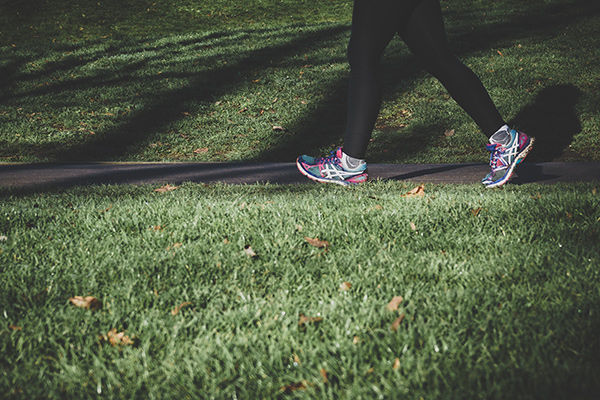Diminished fitness and activity during the pandemic can result in serious health issues, says U of A Augustana professor
Jane Yardley - 18 March 2021

Something as simple as walking for 20 to 30 minutes per day will help you reap the benefits of regular exercise explains Augustana physical education professor Jane Yardley (Photo: Arek Adeoye on Unsplash).
The COVID pandemic and the resulting restrictions have changed the way that many of us are living our lives. Every facet of our daily lives has been impacted. In terms of well-being and health, COVID has had an obvious impact as indicated by people’s increasing reliance on mental health professionals and mounting mortality rates. The actual death toll of the pandemic is much higher when we include people who didn’t get screened for cancer and other life-threatening conditions. Then there are those people whose fitness and activity diminished during lockdown, resulting in serious health issues.
Fortunately, many people who were physically active before the pandemic began have found different ways to stay active as team sports, gyms and recreational facilities have periodically closed or limited their capacity. For many who weren’t all that active to begin with, the pandemic has resulted in even lower levels of physical activity. Here are three very important reasons why we should all keep (or start) moving our bodies in the face of COVID-19.
To begin with, exercise improves immune system function. One of the common features of individuals who risk hospitalisation and poor outcomes with COVID-19 infection is systemic inflammation. This type of inflammation can be caused by smoking, carrying extra weight, excess alcohol intake or high levels of stress. As many of these causes of inflammation are also known side effects of living through a pandemic, it is essential to do everything possible to decrease their adverse effects. Regular physical activity is known to substantially decrease systemic inflammation. It also improves the immune system’s ability to detect and destroy invaders, such as the coronavirus responsible for COVID-19.
Second, many of the health conditions known to increase the risk of severe COVID are improved with regular physical activity. Being overweight/obese, having type 2 diabetes, high blood pressure and heart disease are underlying health conditions that are known to increase the risk of developing severe COVID-19. Regular physical activity is known to prevent the development of these conditions and can decrease their progression and/or severity. As a result, your body will be in a better position to not only fight off the virus but will also be better able to handle the effects of the infection if it happens.
Finally, people who exercise are happier. Being confined and deprived of our activities makes most of us cranky. As creatures of habit, changes to our living and working environments are generally stressful. Chronic stress can interfere with everything from digestion, to sleep, to social interactions with friends and family. Stress can also decrease the function of the immune system. People who are active and exercise on a regular basis generally rate their quality of life higher than those who do not. This rating is not surprising, as regular physical activity is known to decrease the effects of chronic stress and to improve all of the systems with which it interferes. If a pill could improve sleep, help fight disease and improve relationships with family, friends and coworkers, wouldn’t you want to take the maximum dose daily?
Remember that it is not necessary to be an elite athlete. Something as simple as walking for 20 to 30 minutes per day (which doesn’t have to be all at once) is more than enough to reap all of these benefits. There really is no better time than the present to stay—or become—physically active.
Jane Yardley, Physical Education, Augustana Campus, University of Alberta. This column was originally published in the Camrose Booster on January 26, 2021.